 In Brief
In Brief  ECHR f.Jurisconsult prof.V.Berger: Religious Freedom at Risk by Salles'Report on Sects+minors at CoE
ECHR f.Jurisconsult prof.V.Berger: Religious Freedom at Risk by Salles'Report on Sects+minors at CoE
ECHR f.Jurisconsult prof.V.Berger: Religious Freedom at Risk by Salles'Report on Sects+minors at CoE
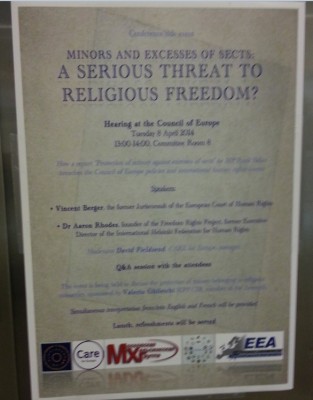
*Strasbourg/CoE/- Religious Freedom could be "undermined" and exposed to undue "Risks" because of several Controversial points contained at a Draft Report on Sects and Minors, prepared by MEP Salles, which is scheduled to be debated and voted at CoE's Parliamentary Assembly on Thursday, denounces the experienced ECHR's former Jurisconsult, Vincent Berger, professor at the European School of Bruges, in a CoE sidelines' event organized by the President of its PanEuropean Parliamentary Assembly's Social, Health and Development Committee, MEP Valeriu Gihletchi from Moldova, of the ChristianDemocrat/EPP Group.
Exceptionaly, without endorsing any side's position without a thorough examination of the respective arguments at debate, but given the Timely proximity of Thursday's debate and vote at CoE's Assembly, "EuroFora" publishes Berger's critical presentation (that he read and discussed at a special Hearing in the CoE and kindly gave us) in full , so that all those interested at this issue can have a chance to form their final stance by taking into account also these Legal observations :

-----------------------------------------------------------
THE PROTECTION OF MINORS AGAINST EXCESSES OF SECTS:
THE SALLES REPORT1
Note by Vincent Berger2
(24 March 2014)
1. Obviously, the protection of minors is a legitimate concern in the democratic societies composing the Council of Europe. The Salles Report is however far from responding to this concern satisfactorily.
A. Diversion targets
2. Despite its title, the Salles report contains many passages which are of general scope and suggest that minors are used as a collateral or a pretext for an offensive against "sects" .
a) A specific target
3. The draft recommendation3 deals exclusively with the protection of minors. It therefore corresponds to the official purpose of the report.
b ) A general target
4. As to the draft resolution, it is aiming at a much larger target4. Indeed, half of its points do not refer to children and teenagers: they concern "religious and spiritual sectarian groups" (§ 6.3) , "sectarian excesses" (§ § 6.6, 6.7 and 6.8) and "cult phenomenon" (§ 6.6).
5. This is also the case with the explanatory memorandum, including important developments that have no relationships with minors (§ § 11-13 , 22-26 , 28, 35 , 37 and 42-44) .
6. The same applies to the summary of the responses by parliamentary delegations of Member States to the questionnaire sent by the Rapporteur (§ § 1 a) -d) and 2 b) - d)), which was also often of a general nature .
B. Unfounded premises
7. Salles report is based on premises whose relevance is questionable, whether explicit or implicit.
a) Explicit premises
8. A European approach is necessary to protect minors: this is far from obvious, to the extent that, according to the Rapporteur himself, many countries do not face serious cases of "sectarian excesses" affecting minors and that the vast majority of the States deem useless to legislate on this issue.
9. The " sectarian excesses " against minors are a "deeply worrying phenomenon" (explanatory memorandum, § 38) and "remains very worrying" (explanatory memorandum, § 46 ): this is contradicted by the available data on rare abuses recorded in some States.
b) Implicit premises
10. "Cults" present a priori a danger to minors: this discredits and throws suspicion on all non traditional churches and communities and on all new religious and spiritual groups, while only a tiny minority of these entities may – or may have in the past – given rise to such criticism.
11. The legislation of Member States, and particularly criminal law, is not sufficient to protect minors: this is a serious accusation against national legislators, suspected of negligence, or even complacency, towards dangerous groups.
12. Public services of Member States do not perform their duties properly, in particular to ensure schooling and health of minors: here again, this is an accusation aimed at national authorities.
C. Questionable models
13. In a veiled yet clearly way, the draft resolution and especially the explanatory memorandum are campaigning for combative systems against "sectarian excesses", that are supposed to be effective and valid throughout all of Europe.
a) The French "model"
14. The French system, in particular, is presented as a model that should be adopted by all other Member States. But it has not proven its effectiveness, as shown by the paltry number of abuse cases reported by Miviludes. As to the About / Picard law, it has aroused the concern of the Parliamentary Assembly, which invited the French government to reconsider it (Resolution 1309 (2002) Freedom of religion and religious minorities in France, § 6), without success. However, the draft resolution advocates repression – without, however, any reference to minors – of the "abuse of psychological and / or physical weakness of persons ". This is a concept that lies at the heart of the French law but is devoid of scientific value.
b) The German "model"
15. The German system is also portrayed favorably, although less emphasized. Catholic and Protestant churches play an important role in "counseling victims of ‘sectarian excesses’ and gathering information on sectarian groups" (explanatory memorandum, § 38). The Rapporteur encourages the authorities to grant them financial support for this purpose. However, we can question the neutrality of such churches, which are in direct competition with "cults". One must also consider the risk for the State to delegate its powers to private institutions, to the point that they become the armed branch of public authorities.
D. Redundant initiatives
16. Apart from the aforementioned dangers and drawbacks, the Salles report does not provide any "added value" to the works of the Parliamentary Assembly on the issue and is often only repetitions.
a) Previous works
17. The works of the Parliamentary Assembly on the protection of children against abuses led to Resolutions 1530 (2007) and 1952 (2013) and Recommendations 117 (2007) and 2023 (2013). They have a triple character. First, they are very recent. Then they remedy what seems to appear, in the eyes of the Rapporteur, a deficiency of the European Parliament in the considered field. Finally and most importantly, they cover all issues related to violations of the physical or moral integrity of children. They appear therefore amply adequate.
b) The draft resolution
18. On a general level, the Parliamentary Assembly adopted Recommendations 1178 (1992) and 1412 (1999): the first is about sects and new religious movements, the second about the illegal activities of sects. Yet the draft resolution includes two invitations that are already contained in Recommendation 1412 (1999) (§ 8 and § 10 ii and iv.) "to provide teaching in the history of religions and the main philosophies in schools" (§ 6.4) and "to make sure that compulsory schooling is enforced and ensure strict, prompt and effective monitoring of all private education, including home schooling"(§ 6.5).
E. Inaccurate assumptions
a) The explanatory memorandum
19. The Salles report notes that "The ECHR has never issued judgments directly concerning minors who have been victims of the influence of sects either directly or through their parents or persons caring for them" (explanatory memorandum, § 14). He explains this in part by "the specific nature of proceedings before the Court" and the "lack of legal capacity to act" of minors under domestic law ( ibid.). He adds that " it is hard to imagine a situation in which parents or legal guardians – followers of a sect – would turn to the courts to protect the children concerned against themselves" (ibid.). He thus suggests that children are helpless, which is incorrect .
b) The Strasbourg jurisprudence
20. States party to the European Convention on Human Rights have a positive obligation to protect individuals. This obligation applies primarily to minors and may be invoked before the national courts by relatives who deem that they are in danger. It is the same in Strasbourg: an indirect victim of a violation of the Convention can complain since he/she has a specific and personal connection to the direct victim. This would be the case of close relatives such as grandparents and aunts or uncles. The absence of ECHR judgments concerning minors affected by "sectarian excesses" is therefore not explained by any impossibility to file applications meeting the conditions of admissibility.
F. Conclusion
21. If they were adopted as such by the Parliamentary Assembly , the draft resolution and the draft recommendation would be likely to seriously undermine religious freedom and freedom of association guaranteed by the European Convention on Human Rights. Indeed, they cast aspersions on all new religious and spiritual groups that have emerged in Europe alongside traditional churches and denominations, in suspecting them, a priori, of "sectarian excesses" unlawful and harmful to minors.
----------------------------------------
1 Report by M. Rudy Salles, Committee on Legal Affairs and Human Rights, Parliamentary Assembly of the Council of Europe.
2 Attorney at law at the Paris Bar and professor at the Collège d’Europe in Bruges and Warsaw; former jurisconsult of the European Court of Human Rights.
3 Adopted by the Committee on March 3, 2014.
4 Adopted by the Committee on March 3, 2014.
---------------------------------------------------------------------------------
Main Menu
Αρχική Press Deontology/Ethics 2009 Innovation Year EU endorses EuroFora's idea Multi-Lingual FORUM Subscribers/Donors Συχνές ερωτήσεις Η άδεια του Elxis Σύνθετη αναζήτηση EuroFora supports Seabird newsitems In Brief European Headquarters' MAPs CoE Journalists Protection PlatformBRIEF NEWS
- 00:00 - 02.06.2021
- 00:00 - 18.10.2020
- 00:00 - 19.06.2020
- 00:00 - 18.05.2020
- 00:00 - 20.04.2020
- 00:00 - 02.02.2020
- 00:00 - 09.12.2019
- 00:00 - 27.11.2019
- 00:00 - 16.11.2019
Popular
- Yes, we could have prevented Ferguson riots says World Democracy Forum's Young American NGO to ERFRA
- Spanish People Elect CenterRIGHT Majority with 1st Party and Total of 178 MPs (6 More than the Left)
- Pflimlin's vision
- The European Athletic "Dream Team", after Barcelona 2010 Sport Championship Results
- Source Conseil d'Europe à ERFRA: Debatre Liberté d'Opposants à Loi livrant Mariage+Enfants à Homos ?
- Head of BioEthics InterGroup, MEP Peter Liese : "Embryonic stem cell research reaching its END" !?
- Spain: Jailed Turkish Terror suspect with Explosive,Drones,Chechen accomplices stirs Merah+ Burgas ?
- UN Head Ban Ki Moon at CoE World Democracy Forum : - "Listen to the People !"
Latest News
- EUOmbudsmen Conference 2022: Digital Gaps affect People's Trust threaten EF Project on EU Future ?
- French Election : Black Out on Virus, but Obligation for Fake 'Vaccines" Challenged
- Both French Presidential Candidates point at "Humanism" in crucial times...
- France : Zemmour = Outsider may become Game Changer in Presidential + Parliamentary Elections 2022
- PACE President Cox skips Turkey Worst (Occupation) case compared to Russia (DeMilitarisation) query
Statistics
Επισκέπτες: 56816466Archive
Login Form
Other Menu
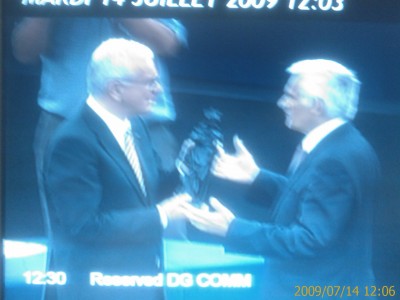
Scientific innovation joined to Faith for Human Rights, Eastern Partnership and fight against the Crisis, but above all, the need to overcome the "Crisis of Trust" from EU Citizens, are the main priorities for new EU Parliament's President, Polish Jerzy Buzek, that a 555-votes-strong majority of MEPs on July 14, Strasbourg made a living symbol of the fact that, 20 years after the fall of Berlin Wall (1989 - 2009) there is no more an Eastern or Western Europe, but only one Europe, as the head of the largest group of MEPs, ChristianDemocrats/EPP, Joseph Daul, stressed after the event.
Speaking later to a group of Strasbourg's Journalists, including "EuroFora", the new EU Parliament's President clarified his stance on concrete topical issues, as f.ex. that of Turkey's controversial EU bid, which was one of the main issues of the June 2009 Electoral campain, clearly won by his party of ChristianDemocrats/EPP : - "At present, Turkey does not fullfil none of EU conditions", he stressed, (See infra).
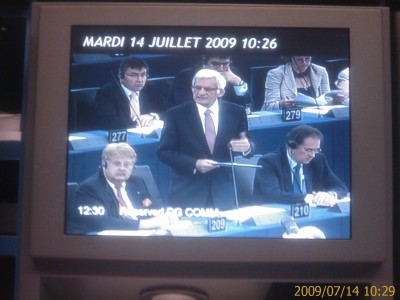
Buzek is well known in Strasbourg and to "EuroFora" as EU Rapporteur for the Framework Program of Scientific Research and Development of Technologies. A Natural Science Professor from the Historic and Religious landmark Polish City of Częstochowa, active in the famous Solidarnosk grass-roots social movement, he served 4 years as Prime Minister (1997-2001), before being elected as MEP in 2004 and 2009, after he brillantly won the latest EU Election at the head of his party (EPP) almost doubling the number of its MEPs from 15 to 28 !
- "Innovation" and "Energy safety", as well as fight against the "Cimat change", but also "Eastern Partnership", the "Mediterranean", "Strategic partnerships" with Russia, the USA, etc, and the search for "solutions to the Economic Crisis" that EU Citizens "expect" from us, will be his "priorities", announced from the outset the new EU Parliament's President, reminding also that the quest for "Human and Civic Rights" played an important role in his experience with the Solidarnosc grass-roots social movement in Poland's History
But, the most important of all, is the urgent need to overcome the "Crisis of Trust" between EU Institutions and the People he stressed : - EU "Citizens often don't understand us", denounced Buzek, launcing a call to "do anything for EU Citizens to understand our work" in EU Parliament : "We (MEPs) need to make EU Citizens involved" in "what we are doing every week, in Strasbourg and Brussels", he proposed. Pointing f.ex. to the hot "Debates" with "strong arguments" exchanged between MEPs during the preparation of their Legislative Decisions, in Committees, delivering often hard struggles between initially opposed points of view, long before forging a majority at the final vote, sometimes more than a year..
Therefore, EU Parliament will be "open to your criticism, for discussion and exchange of views", he promissed to Journalists in Strasbourg.
In this way, Buzek, in fact, highlighted "EuroFora"s main idea, that we strongly advocate since 1997-2007, to systematicaly and actively involve EU Citizens in public debates during the decision-making process of important EU measures, which affect their lives and the society in which they live, (and not only just a few weeks each 4 or 5 Years at the eve of EU Elections)...
--------------------
This is related also to the symbolic gift that Buzek chose to give to the out-going former EU Parliament's President, Hans Gert Poettering, (2007-2009), his collegue in the ChristianDemocrats/EPP, who brillantly won 2009 EU Elections in Germany : A genuine statute of sainte Barbara crafted in Silesia's black Coal by Polish Miners : Those simple but strong people who fought for social change against some technocrats and bureaucrats disguissed into so-called "real-socialists" of old times. (PHOTO).
It's enough to have seen a popular open air mass, at Warsaw's center, with many thousands of people, old and young, simple workers and intellectuals mixed together, with references to Poland's history and struggles for survival and liberty, through various ages, (as fex. that organized at the eve of CoE's 2005 panEuropean Heads of State and Government for the beatification of late Pope John-Paul II), in order to understand what such symbols mean..
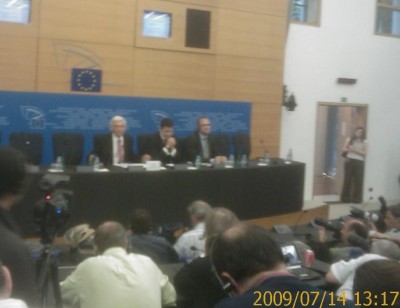
But, overcoming the "Crisis of Trust" with EU Citizens obviously implies also to rectify any errors done in the past, fex. on Turkey's controversial EU bid, with controversial decisions taken in 1999 and 2004 to give a "candidate" status and to start EU negotiations, provoking an unprecedented series of 3 "No" to EuroReferenda and 3 Majoriy Abstentions in EU Parliament Elections : 1999, 2005 and 2009, (even if the latest one succeeded to decelerate and almost stop the drop of participation rates, opening hopes for vote's revival after an electoral campaign clearly critical to Turkey's claims in several mainstream EU countries)
Therefore, Buzek was faced with manifold critical Questions on EU Enlargement, most of them citting concrete examples of certain political problems : But his replies were almost always given as a matter of general principle :
F.ex. Questioned on the suspension of EU - Croatia talks because of a Border conflict with EU Member Slovenia, Buzek prefered to speak about principles :
- "We know that during Enlargement, the process can be blocked by failure to resolve this kind of issues", This concerns also other enlargments' cases", and "these rules are always in force" he warned.
But Buzek avoided to directly reply to a queston on "French and German EPP' calls to define the Borders of Europe", as a German journalist asked him by making a reference to French President Nicolas Sarkozy, and German Chancellor Angie Merkel's, critical statements on Turkey at the June 2009 Electoral campain.
- "Concerning Enlargement, there's always the same rules : There have to be Criteria, which have to be respected if a Country wants to join the EU", he started to simply reply.
- "For my country (Poland) it took us 15 Years to fullfil these Criteria", Buzek reminded, indicating, if proportions are kept, that Turkey, fex. would have to spend some 25 years before eventually joining the EU..
- "Countries wishing to join the EU need to Change their Systems", as we (Poland and other former Eastern European Countries) did, he stressed.
- "'For me, meeting the condition of Human Rights is one of the Key conditions for membership in the EU", preferring again to speak from the point of view of General Principles, on the occasion of an untimely question on Serbia (which is not even a candidate yet)...
- "Turkey" has, "first of all", to fullfil (EU) Copenhagen criteria". Bevause, currently, none of them is fullfiled by Turkey", New EU Parliament's President, denounced, speaking later to a group of Journalists, including "EuroFora".
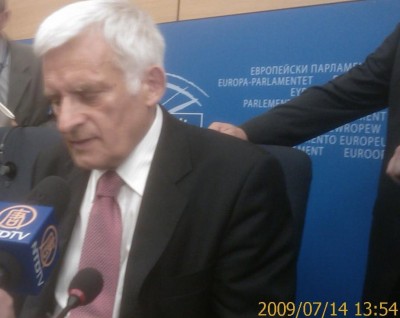
In particular, on Human Rights : - "We (EU) can never forget Human Rights", because "this is at the very Foundations of the EU", Buzek added.
On the contrary, when he referred to EU Enlargment for the "Western Balkans Countries ", Buzek appeared upbeat, finding "promising situations", despite "difficulties" in the Past, since "Countries are queuing to become EU members", and this "generated changes", as he said.
As for Russia, Buzek observed that it was a "very important" country, located "in the same Continent", Europe, "close to our borders", and "we need eachother". "But Russia' has 'differend poblems : "They claim that their system is Democratic, but rules are differend", and we must be "aware of such differencies", fex. "on Human Rights", that we can't ignore, as he said;
Concerning China, where a journalist observed that the recipient of EU Parliament's latest "Sakharov prize" for freedom of thought is "still in prison", Buzek found that since the 1999 events in Tien Amin square, "we see differencies on Human Rights still today", and expressed his "support" for those who try to ameliorate the situation.
On the contrary, speaking recently to "EuroFora" he strongly supported the idea for an EU - Ukraine cooperation, fex. between Airbus and Antonov, in order to build a less costly but more performant than the old and problematic A400M, new Military Transport Airplane : - "They (Ukranian Antonov Company) can certainly do it. I'm sure they can. It's a good Idea, and I'd be glad if it was done", he told us. (See : http://www.eurofora.net/newsflashes/news/airbusantonov.html )
Polls
SMF Recent Topics SA
- Record Hospitalisati... (0) από Breadman
- How Many Infected by... (1) από Thunderbird
- Real Cause for Europ... (0) από Breadman
- Interesting Australi... (0) από Aurora
- Plus de mRNA Faux-&q... (0) από Aurora
- EU: Lukashenko as E... (0) από WKalina
- Why NATO in Ukraine,... (0) από Geopol
- Afghanistan's key : ... (0) από Thunderbird
- Anti-Pass Demonstrat... (0) από Aurora
- Veran - Fioraso : Mê... (1) από JohnsonE


















